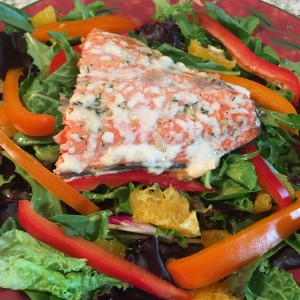 Although the decline in estrogen that occurs during menopause is the most influential factor for the development of osteoporosis, there are several other mechanisms that contribute to bone loss as we age. One prominent mechanism is through a process called oxidative stress.
Although the decline in estrogen that occurs during menopause is the most influential factor for the development of osteoporosis, there are several other mechanisms that contribute to bone loss as we age. One prominent mechanism is through a process called oxidative stress.
What the heck is oxidative stress? Oxidative stress, simply put, is the damage caused to a cell through oxidation; the interaction the between oxygen molecules and the substances they come in contact with, such as metal or living tissues. When a freshly-cut apple turns brown, the fender of your car becomes rusty or a copper penny turns green you are witnessing oxidation.
Here are just some of the diseases that are caused by oxidative stress:
• Heart Disease
• Cancer
• Arthritis
• Lung Disease
• Fibromyalgia
• Diabetes
• Neurodegenerative Diseases like Parkinson’s and Alzheimer’s
• Autoimmune Diseases
• Eye Diseases like Macular Degeneration
Oxidative stress also contributes to bone loss in both women and men!
It is thought that oxidative stress activates osteoclast production, increasing bone breakdown, while suppressing the osteoblast cells that initiate bone formation.
Many of us are familiar with the term “antioxidants” as nutrients in food that have beneficial health effects. Antioxidant nutrients inhibit oxidation and protect our tissues from the damage caused by oxidative stress. Vitamin C is one of our most powerful antioxidant nutrients.
Studies have shown that vitamin C can reduce oxidative stress, prevent bone loss and reduce fracture risk. It has been shown that not only is dietary intake of vitamin C positively associated with bone mineral density in postmenopausal women, but that an inadequate vitamin C intake could actually increase the risk of osteoporosis. The Framingham Osteoporosis study also noted that women whose diets provided the most vitamin C had significantly fewer fractures than women whose diets provided the lowest amount of vitamin C. Beyond its importance as an antioxidant, vitamin C is also important in collagen formation which helps to build a strong bone matrix and supports the development of osteoblasts, bone building cells.
Considering the importance antioxidant role vitamin C plays in keeping you healthy as well as all the ways it supports strong bones, we should all make sure we are getting enough vitamin C every day. Foods rich in vitamin C include vegetables like peppers, broccoli and Brussels Sprouts and fruits such as papaya, strawberries, pineapples and oranges.
Try this wonderful summer salmon salad which is rich in vitamin C and numerous other bone building nutrients!
Summer Citrus Salmon Salad

[su_spacer size=”1″]
Salmon Marinade
2/3 cup freshly squeezed orange juice (squeeze a full cup to use in both the marinade and the dressing below)
2 tablespoons of RAW honey
3 small cloves garlic, minced
1 tablespoon of fresh thyme, minced
2 teaspoons finely grated orange peel
4 WILD caught salmon fillets, or a 16 oz wild salmon fillet
[su_spacer size=”1″]
Salad
8 ounces of organic mixed salad greens or spinach
½ red bell pepper, thinly sliced
½ yellow or orange bell pepper, thinly sliced
1 shallot, thinly sliced crosswise into rings
Citrus Vinaigrette
2 tablespoons extra virgin olive oil
1 tablespoon white wine vinegar
1/3 cup freshly squeezed orange juice
1 SMALL garlic clove, minced
Freshly ground sea salt and pepper to taste
Preparation:
Whisk or blend marinade ingredients together and place in baking dish. Add salmon, flesh side down in the marinade and marinade for 1-4 hours.
When marinating is complete, pour off marinade and cook salmon (flesh side up) at 350 degrees for 20-25 minutes, depending on your desired level of “doneness.”
Prepare citrus vinaigrette by whisking or blending all ingredients.
Prepare salad by tossing ingredients.
Divide salad on plates, drizzle with vinaigrette. When salmon is cooked to your liking, place salmon on top of salad and serve!
Contact Susan today to schedule a free 15 minute phone consult to learn more about the BONES Method™ and how it can help you achieve strong, healthy bones for life!
References:
1. Kim, Y. A., Kim, K. M., Lim, S., Choi, S. H., Moon, J. H., Kim, J. H., . . . Shin, C. S. (2015). Favorable effect of dietary vitamin C on bone mineral density in postmenopausal women (KNHANES IV, 2009): discrepancies regarding skeletal sites, age, and vitamin D status. Osteoporosis International,26(9), 2329-2337. doi:10.1007/s00198-015-3138-6
2. Sahni, S., Hannan, M. T., Gagnon, D., Blumberg, J., Cupples, L. A., Kiel, D. P., & Tucker, K. L. (2009). Protective effect of total and supplemental vitamin C intake on the risk of hip fracture—a 17-year follow-up from the Framingham Osteoporosis Study. Osteoporosis International,20(11), 1853-1861. doi:10.1007/s00198-009-0897-y
3. Pizzorno, L., & Wright, J. V. (2011). Your Bones: How You Can Prevent Osteoporosis and Have Strong Bones for Life–Naturally. Lanham: Axios Press.






